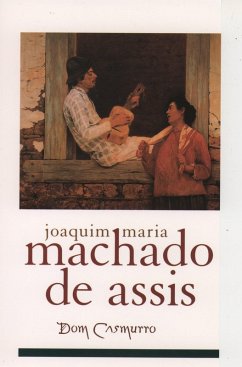"A palm tree, seeing me troubled and divining the cause, murmured in its branches that there was nothing wrong with fifteen-year old boys getting into corners with girls of fourteen; quite the contrary, youths of that age have no other function, and corners were made for that very purpose. It was an old palm-tree, and I believed in old palm-trees even more than in old books. Birds, butterflies, a cricket trying out its summer song, all the living things of the air were of the same opinion." So begins this extraordinary love story between Bento and Capitu, childhood sweethearts who grow up next door to each other in Rio de Janeiro in the 1850s. Like other great nineteenth century novels--The Scarlet Letter, Anna Karenina, Madame Bovary--Machado de Assis's Dom Casmurro explores the themes of marriage and adultery. But what distinguishes Machado's novel from the realism of its contemporaries, and what makes it such a delightful discovery for English-speaking readers, is its eccentric and wildly unpredictable narrative style. Far from creating the illusion of an orderly fictional "reality," Dom Casmurro is told by a narrator who is disruptively self-conscious, deeply subjective, and prone to all manner of marvelous digression. As he recounts the events of his life from the vantage of a lonely old age, Bento continually interrupts his story to reflect on the writing of it: he examines the aptness of an image or analogy, considers cutting out certain scenes before taking the manuscript to the printer, and engages in a running, and often hilarious, dialogue with the reader. "If all this seems a little emphatic, irritating reader," he says, "it's because you have never combed a girl's hair, you've never put your adolescent hands on the young head of a nymph..." But the novel is more than a performance of stylistic acrobatics. It is an ironic critique of Catholicism, in which God appears as a kind of divine accountant whose ledgers may be balanced in devious as well as pious ways. It is also a story about love and its obstacles, about deception and self-deception, and about the failure of memory to make life's beginning fit neatly into its end. First published in 1900, Dom Casmurro is one of the great unrecognized classics of the turn of the century by one of Brazil's greatest writers. The popularity of Machado de Assis in Latin America has never been in doubt and now, with the acclaim of such critics and writers as Susan Sontag, John Barth, and Tony Tanner, his work is finally receiving the worldwide attention it deserves. Newly translated and edited by John Gledson, with an afterword by Joao Adolfo Hansen, this Library of Latin America edition is the only complete, unabridged, and annotated translation of the novel available. It offers English-speaking readers a literary genius of the rarest kind.
Dieser Download kann aus rechtlichen Gründen nur mit Rechnungsadresse in A, B, BG, CY, CZ, D, DK, EW, E, FIN, F, GR, HR, H, IRL, I, LT, L, LR, M, NL, PL, P, R, S, SLO, SK ausgeliefert werden.

